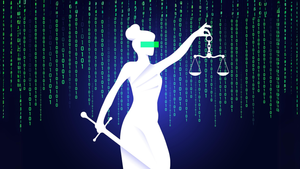Universal Music called for the introduction of a US-wide publicity right during the latest Congressional hearing on artificial intelligence yesterday.
The major’s General Counsel also set out the agenda of the Human Artistry Campaign, and stressed the importance of transparency around generative AI, seeking clarity on both when AI has been used to generate content and what data has been employed to train any one AI model.
The regulation of artificial intelligence is high on the political agenda in most countries now, of course. In Washington, the House Judiciary Committee previously held a session looking specifically at the copyright issues raised by AI. And yesterday the Senate Judiciary Committee did the same, with Universal Music’s Jeff Harleston speaking for the music industry during that session.
In his testimony to the committee, he set out how the music industry is already employing AI technologies, including in the music-making process and as a tool for music marketing. And he spoke about the potential for future use of generative AI by artists and their business partners.
“One of our distributed artists”, he observed, “South Korean artist Lee Hyun, used a generative AI system to train on recordings of his vocals, allowing him to simultaneously release his single in six languages – in his own voice – on the same day. Here, the ethically trained tool enhanced and extended the artist’s creative intent – with his consent – enabling him to reach new markets and fans”.
“Imagine”, he went on, “an artist or songwriter creating personalised recordings for fans – such as ‘Happy Birthday’ or perhaps a brand-new creation. Imagine the ability to perform a concert and livestream it globally in dozens of languages simultaneously. Imagine collaborations never even dreamed before. It’s a powerful technology – and once there is a more responsible, legal, and respectful AI marketplace, the opportunity for creators is vast”.
And, he stressed, Universal Music – and the music industry at large – is eager to collaborate with the makers of generative AI technologies. But only if those tech companies respect copyright and other artist rights. And, for the music industry, that begins with those companies seeking licences from record labels and music publishers before they use any existing recordings or songs to train their AI models.
However, of course, some AI companies argue that the training of AI is covered by copyright exceptions in some countries – and maybe even the fair use principle under US law – which would mean they wouldn’t necessarily need to secure licences for that activity.
“It’s unfathomable to think AI companies and developers think the rules and laws that apply to other companies and developers don’t apply to them”, Harleston declared. “Beyond the issue of copyright infringement, these generative AI companies are often obtaining our content from sources that explicitly prohibit downloading and use of that content outside of personal and non-commercial purposes”.
“We’ve also seen examples of AI-generated music being used to generate fraudulent plays on streaming services, siphoning income from human creators”, he went on. “And we’ve seen many troubling cases where an artist’s name, image, likeness or voice is used without their knowledge or authorisation – to generate videos of them saying things they didn’t say, to use their voice and recordings without their knowledge, or to exploit their name to promote fraudulent works”.
But what can lawmakers do to help the music industry and other copyright owners tackle all these issues? Well, Harleston said, pay attention to the music industry-led Human Artistry Campaign, which insists that permission should be sought before any AI companies utilise copyright-protected works, or seek to imitate or clone the voices or identities of human creators. And that no new copyright exceptions should be considered that could remove that requirement.
Interestingly, Harleston then honed in more specifically on the use of AI to generate ‘deep fake’ vocal clones of established artists, referencing the headline-grabbing track that did just that with the voices of Drake and The Weeknd, both Universal-signed artists. When it comes to artists protecting their voices or identities, we move beyond copyright, with publicity or personality rights most likely to provide that kind of legal protection.
However, in the US publicity rights exist at a state rather than US-wide federal label. “We urge you to enact a federal right of publicity statute”, Harleston said. “Deep-fake and/or unauthorised recordings or visuals of artists generated by AI could lead to consumer confusion, unfair competition against the actual artist, market dilution and damage to the artist’s reputation and brand – potentially irreparably harming their career”.
“An artist’s voice is the most valuable part of their livelihood and public persona”, he added, “and to steal it – no matter the means – is wrong”.
Earlier this week, UK Music set out its priorities when it comes to the regulation of AI. It also bigged up the Human Artistry Campaign and stressed the copyright and transparency obligations of AI companies. And it also referenced publicity or personality rights, which don’t currently exist at all under UK law, stating that “a new personality right should be created to protect the personality/image of songwriters and artists”.

